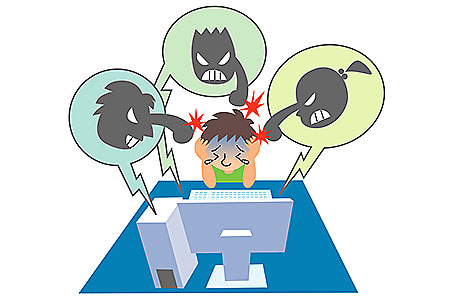
Here is the third part of a series of questions and answers on teenagers
Here is another question on teenagers, with some answers from Focus on the Family.
Question: I’ve been hearing horror stories about the devastating effects of “cyber-bullying” among teens and younger kids. What’s worse, I have reason to believe that my child may be a victim. How can I know for sure? If it is true, what can I do to help?
Answer: The relative openness of social networking can translate into vulnerability, and the anonymity it affords easily becomes a convenient cover for abusers.
If you suspect your child is a victim of cyber-bullying, we strongly advise decisive action through the following steps:
1. Approach your child directly with your concerns.
You can start by asking if they enjoy the social networking websites they visit. Don’t be surprised if your child is reluctant to talk though, as victims of any form of bullying may not reveal their distress because of shame, embarrassment or fear of further mistreatment if they raise the situation with authority figures.
If this is the case, look for any of the following signs:
• Unexplained emotional changes
• Depression or nervousness
• Withdrawal or secrecy
• Sadness or tearfulness
• Overeating or a refusal to eat
• An obsession with the phone or computer
• Listlessness or loss of interest in favourite activities
Uncharacteristic behaviours such as stealing or lying could mean your child is a victim of extortion.
If you conclude that your child is indeed dealing with cyber-bullying, broach the subject frankly. Let them know that they are not alone and you are there to listen and support.
Help your child see the injustice of the mistreatment and not blame themselves for it. Say something like, “This situation is not okay. No matter what others are saying, you’ve done nothing to deserve this abuse. We are going to put a stop to it somehow.”
2. Work with your child to establish appropriate boundaries for future online and texting activity.
Insist that your child takes a break from activities of this nature for a designated period of time, to heal emotionally and repair any damage to their social reputation.
If the bullying escalates, becomes physical or involves threats of violence, seriously consider finding a new school or moving your child into a new environment. But don’t jump at this option too quickly, as it may reinforce any withdrawal symptoms and emphasise your child’s feelings of weakness, inadequacy, and fear.
Ultimately, your child will be a stronger and better person from learning to face adverse circumstances with courage and confidence.
3. Draw on the help of other trusted adults, such as school authorities, counsellors or a family friend.
Acquaint yourself with the culture of your child’s school and identify the teachers who have the most direct contact with the students. Don’t leave yourself and your child to face this threat alone.
Used by permission of Focus on the Family Singapore. For more parenting resources, visit www.family.org.sg.
© 2010 Focus on the Family. All rights reserved. International copyright secured.
Republished from Issue 43.
ADVERTISEMENTS




